With all the talk about a possible Star Trek: Short Treks musical we thought we would have Laurie and Neil turn their gaze to the times Star Trek brought a little Broadway song and dance to the final frontier.
In musical theatre, a character only breaks into song when the ideas or feelings they’re trying to express become too much for words alone. And, at least since Oklahoma! set the standard, that song will have an actual job to do—typically either advance the plot or illuminate character.
On the rare occasions that Star Trek characters sing, the music often gives us new insights into the inner lives of our heroes. Other times they function more like the big, fun dance numbers that open the second act of musicals, basically existing to keep the audience engaged while they’re returning to their seats. And sometimes they’re simply a type of “Chekhov’s gun”—when space hippies show up in the first act, they have to sing a song about getting hassled by the man by the third act.
Here are some of our favorite Star Trek musical interludes, starting with the TV shows and then moving on to the movies.
Star Trek: The Original Series
“On the Starship Enterprise” from from “Charlie X”
The first Star Trek episode to air, “The Man Trap,” features an interlude in which Uhura tries to engage Spock in a little conversation.
UHURA: Why don’t you tell me I’m an attractive young lady, or ask me if I’ve ever been in love? Tell me how your planet Vulcan looks on a lazy evening when the moon is full.
SPOCK: Vulcan has no moon, Miss Uhura.
UHURA: I’m not surprised, Mister Spock.
The very next episode to air, “Charlie X,” builds on that moment as we visit Uhura and Rand in a rec room, chatting and playing cards while Spock quietly plays a tune on his Vulcan harp. Uhura starts singing along, loudly and wordlessly, much to the annoyance of Spock. But when Uhura apologizes, Spock grins devilishly and, almost tauntingly, begins playing a new tune. When Rand urges her on, Uhura stands and starts singing an impromptu song about Spock. Is it any wonder that the Kelvinverse producers envisioned Spock and Uhura as a couple?
When space orphan Charlie Evans interrupts the scene, Uhura turns her sights on him, coming up with a second verse that ends up making both Charlie and Rand uncomfortable, resulting in a demonstration of Charlie’s strange, otherworldly powers.
Although the “Charlie X” storyline was part of Gene Roddenberry’s original pitch to the network, D.C. Fontana ended up writing the actual episode. However, Roddenberry still had a hand in the final version: The script specified that Roddenberry himself would provide the lyrics. The tune comes from a Scottish folk song called “Charlie is My Darling” (did Uhura have a premonition that she’d be creating a verse specifically about Charlie Evans?). Here’s the traditional song—minus Vulcan lyre. – Neil
“I’ll Take You Home Again, Kathleen” from “The Naked Time”
Lt. Kevin Riley launches his own musical comedy variety hour after being infected by an intoxicating alien virus in “The Naked Time.” Tapping into his Irish heritage, he rechristens himself Kevin O’Riley and hijacks the ship’s communications, ordering double portions of ice cream for all hands and singing—over and over and over again— “I’ll Take You Home Again, Kathleen.”
Let me just quote this section of the script, because it not only perfectly describes what we see and hear, it also serves as proof that actor Bruce Hyde absolutely nailed this performance. “Riley should not be one hundred percent accurate with his version of the lyrics… Later, often coming to the end, and for the sake of story accent, he pauses… shouts a lusty ‘One more time’… and begins again… and again… as often as is necessary. Additionally, he is no singer… should hold the pitch but not much more… should overdo the emotional passages and be none too accurate in matching the feelings of the lyric to his interpretation of it.”
It’s a memorable—and delightful—portion of a classic episode. Also, in college several friends and I would force each other to launch into the song at any random moment by shouting “One… more… time!” – Neil
“Beyond Antares” from “The Conscience of the King”
The script describes it as “a strange, soft, delicate love song borne in the depths of space,” and “Beyond Antares” lives up to that billing.
Sung to distract a lonely Kevin Riley who’s stuck by himself in engineering, “Beyond Antares” serves as another showcase for Uhura’s empathy as well as Nichelle Nichols’ lovely singing voice. But while it gives Riley some consolation, it also works a little too well as a distraction—a mysterious figure squirts poison into Riley’s meal. And I mean literally squirts with what is essentially a bottle of Windex. Not the most timeless of props.
Nichols later recorded a new version of the song (complete with disco-y backbeat) for her 1991 album, Out of This World. – Neil
“Hey Out There” from “The Way to Eden”
First off, Herbert, I don’t care what you think. I love this episode. Love it. And it’s chock full of musical moments. We won’t go over all of them here, though, just the main showstopper, “Hey Out There.”
Charles Napier performs (and co-wrote) the song as Adam, the most charismatic member of the space hippies. It’s the big number they play at a concert broadcast throughout the ship. The lyrics center on friendship and understanding and fun, boosting the view that the hippies are just a bunch of free-spirited flower children interested in nothing more than peace and love. Would you be surprised to learn they have a hidden agenda? No, you would not.
Just like the space hippies themselves, I’m not going to stop at just one number after all. I mean come on, this one’s a classic! I wonder if they still have Zippo lighters in the future…? – Neil
“Maiden Wine” from “Plato’s Stepchildren”
People may remember this episode as a silly one, replete with costumes and mostly about that famous kiss, but it gets pretty grim. It’s all about cruelty, using its Greek trappings as a backdrop to show what happens when absolute power corrupts, absolutely.
Parmen, the Platonian leader, has already used his telekinesis to push Spock to his emotional limits. So when Spock is forced into yet another performance, this time to serenade a captive Uhura and Chapel, we know the toll it’s taking on him. Plus he’s a lover of music and art, and now this most basic pleasure has been wrenched out of him and used as punishment for the amusement of the Platonians. It’s a compelling scene, but not, as you’d hope with a song from Spock, fun.
What IS fun is that Leonard Nimoy wrote Spock’s song himself. It’s called “Maiden Wine” (although I will always call it the “bitter dregs” song), and a much more produced version of it appeared on his 1969 album The Touch of Leonard Nimoy.
Also, way back when in the early ‘90s, I used to have a screen saver program installed on my PC that resulted in a tiny Spock walking back and forth across the bottom of my screen, occasionally singing, “Ah, ah… bitter dregs.” – Laurie
Star Trek: The Next Generation
“Heart of Oak” from “Allegiance”
The crew has already begun to suspect that something’s off with their captain, and when he pays a visit to Ten Forward (already an uncommon spot for him, unless he’s looking for Guinan), he confirms it. He orders “ales for everyone” and gets cheers (despite the fact that they can all have as many ales as they want for free), then implores them all to join him as he sings “Heart of Oak” (the official march of the UK’s Royal Navy). It’s the final giveaway that whoever the singing man is, he’s not Jean-Luc Picard.
Director Winrich Kolbe said that Stewart’s performance in “Allegiance” was the reason he likes the episode so much.
I remember talking to Patrick the first time he started playing the clone. I said, ‘I think I need more from you.’ He thought about it and then gave me more. As we rehearsed the scene, we looked at each other and knew he was giving me too much. So, we just pulled it back. Patrick is like Itzhak Perlman with a Stradivarius. You have to compare the Stradivarius to the Joe Schmuck violin. To the untrained eye, they’re no different. But they are different, very different. Patrick played the good guy and the bad guy so close at times, but it was different and it was right.
Stewart, of course, nailed it: Joe Schmuck, he ain’t. – Laurie
“Frère Jacques” from “Disaster”
This episode has all the elements of a good disaster movie: It separates our characters into unlikely groups and challenges them in new ways. For Picard, that means he’s spending his disaster-time with a bunch of kids, who need his leadership to be comforting and parental, a challenge for someone who has never been comfortable around children. To save their lives, he has to keep their spirits up—and he’s not used to leading a crew who breaks into tears under pressure. When they have a long trek up the turbolift shaft ahead, he rises to the occasion and tells them all they need is a climbing song. I kind of wanted to hear Marissa’s suggestion, “The Laughing Vulcan and His Dog,” but what we got was just fine: a rousing rendition of “Frère Jacques.” It’s a song from Picard’s childhood, which helps forge his connection to these three scared kids.
The song is an important one to Picard; it came up in “The Inner Light” as the first song he learned to play on his Ressikan flute, and he played it with Nella Daren in “Lessons.” – Laurie
Star Trek: Deep Space Nine
“Jerusalem” from “Explorers”
Deep Space Nine viewers love the bromance between Bashir and O’Brien, but it was a long time coming; O’Brien couldn’t stand Bashir at first. But by season 3, they’d been through enough together to have become true friends, so when Julian was upset about being snubbed by a former rival, O’Brien was there for him, with some real, comes-in-a-bottle-and-not-from-a-replicator alcohol. (“This isn’t a synth ale kind of night,” Bashir says.)
We find them in O’Brien’s quarters singing “Jerusalem” together, shamelessly loud, shamelessly intoxicated, bonding over the song before they have an honest (but drunken) conversation about their friendship and then go back to singing again. It’s a sweet, silly bonding moment between two men who used to have trouble being in the same room together.
Producers asked Colm Meaney and Alexander Siddig what song they wanted to sing, but couldn’t afford their choices: “Louie, Louie” or “Rocket Man.” They ended up with “Jerusalem,” which Siddig said “was very familiar to both of us. It’s like an anthem in England, and something that drunk people might very well sing.” – Laurie
Star Trek: Voyager
“Falor’s Journey” from “Innocence”
This whole episode was a way to explore a previously uncharted aspect of Tuvok’s personality: his role as a father. When the USS Voyager got stranded in the Delta Quadrant, Tuvok was separated from his four children and we never got to see the parental side of him until “Innocence,” when he found himself stranded on a planet with four alien and very frightened children.
Writer Lisa Klink took advantage of the fact that Tim Russ could sing, and created a lullaby for him to soothe the children with. She worked with a composer to come up with something “suitably somber” to be a Vulcan lullaby, which she felt should have a lesson in it. (It’s only logical.) Tuvok tells the kids, “It is a tale of enlightenment consisting of 348 verses. It may not be necessary to include the complete narrative.” It wasn’t, and the song the did the job… and viewers understood the gentle, caring, paternal side of Tuvok for the first time.
And Klink received a little bonus from it: She got into ASCAP for writing the song, and gets “minuscule” royalties whenever the episode re-airs. – Laurie
“You Are My Sunshine” from “Someone to Watch Over Me” — Seven and The Doctor, part 1
One particularly entertaining storyline on Voyager was the relationship between The Doctor and Seven. The holographic doctor took on the task of teaching the former Borg drone how to become more human. So this song, which introduces a whole new side of Seven of Nine, begins with a lot of highly entertaining Seven/Doctor banter. And when she finally sings, we’re as surprised and delighted as the Doctor is. Borg drones don’t sing, nor does it seem likely that they’d enjoy it, so this musical moment reveals that her journey back towards humanity is well underway. “Music does have intriguing mathematical properties,” my ass.
Jeri Ryan and Robert Picardo recreated the duet in 2015 at Fan Expo in Toronto; here’s the original. The song itself begins at 1:47, but the banter before it is too good to skip. – Laurie
“Oh, My Darling Clementine” from “Equinox, Part II” — Seven and The Doctor, part 2
Dark times for Voyager. They encounter another stranded Starfleet ship, the Equinox, but discover that Captain Ransom and his crew have violated Starfleet principles, murdering alien beings to use them as fuel. Their moral compass has shifted so severely that they’ve lost all conscience about their choices, until Captain Ransom—who was, we know, only looking for the fastest, safest way home for his crew—comes face-to-face with the dark consequences of his choices in sickbay after the Equinox kidnaps both Seven and The Doctor.
The Doctor’s ethical subroutines have been removed, freeing him to gleefully tamper with Seven’s cortical array (which will damage her higher brain functions). Ransom finds the newly sadistic Doctor enjoying his work far too much as he and a fully under-his-control Seven duet on the “old chestnut” known as “Oh My Darling Clementine.” And it’s this moment when Ransom’s conscience finally awakens.
It’s a disturbing scene, made all the more creepy by the fact that we know The Doctor and Seven enjoy singing together as friends; now it’s nothing but cold manipulation. At the end of the episode, when The Doctor is ashamed of what he was forced to do, Seven reassures him by telling him was off-key… in other words, promising him that they will sing together again, and reassuring him that their friendship is unaffected. – Laurie
Star Trek: Discovery
“Space Oddity” from “An Obol for Charon”
The song, a David Bowie classic sung by Tilly and Stamets, went by oh-so briefly but was the touchstone of an intense, emotional, and surprisingly intimate scene.
Stamets had to give a terrified Tilly a cortical implant, but they were locked in his lab with no anesthetic and no real medical instruments… and he was going to have to use an actual drill. He approaches her with a gentleness we hadn’t seen in him often, and before he gets too close, he stops to ask what her favorite song is. She’s startled (and successfully distracted from the looming drill for a moment). She sings “Space Oddity” with quiet trepidation, and he joins in with soothing reassurance. It speaks volumes about their relationship, which has already spent a season and change building to the level of trust they now have in each other. And then the drill hits, and we know that without their musical moment together, she wouldn’t have been able to stand it. (Although you have to suspect that that might not be her favorite song anymore for a while.)
Side note: The cast loves this song; they sang it in their “Carpool Karaoke” episode. And they’re following a tradition: William Shatner also “sang” it (really spoke it) on his 2011 album Seeking Major Tom. – Laurie
Star Trek: Short Treks
“‘S Wonderful” from “Calypso”
In this eloquent, moody Short Treks episode, a man named Craft finds himself aboard an abandoned USS Discovery, sharing space with the ship’s AI, who calls herself Zora (voiced by Annabelle Wallis, Chris Pine’s girlfriend). After she has healed, clothed, fed, and cared for him for some indefinite period of time, she reveals her romantic nature by showing him her favorite movie, Funny Face, starring Fred Astaire and Audrey Hepburn.
And for someone like me who loves Funny Face and the musicals of its era, being able to see it projected onto the bridge of the Discovery makes the scene in the movie even more magical, as well as timeless; here it is, centuries later, just as beautiful and just as able to affect its audience… and that’s when Zora starts humming along. When Craft teaches himself Astaire’s moves and replicates his wardrobe so he can dance with Zora, it’s poetry.
Co-writer Michael Chabon said he wanted it to be something real, which would tell the audience that the story takes place in our universe, where that movie exists, but also in a romantic world that has its own fiction. He said, “Simply by making that implied assertion, I think that there is something powerful in that area. It reminds you: ‘Look, this is still all possible. We can still go into the future. It will be our world, just like the world we’re living in now.’” – Laurie
“I Am the Very Model of a Modern Major-General” from “Q&A”
Michael Chabon wrote “Q&A” to patch what he thought of as a hole in continuity: How did Spock go from broadly smiling at a “singing” plant in “The Cage” to being the glacial, emotionless presence we all now associate with the character?
In this Short Treks episode, it’s Spock’s first day on the Enterprise and he winds up trapped in a turbolift with Number One. He peppers her with questions about Captain Pike, the philosophy of Starfleet, and her own personal preferences, ultimately leading to this exchange:
NUMBER ONE: If you want to command, you’re gonna have to learn to keep your freaky to yourself. Even if that’s painful.
SPOCK: I have been doing that all my life.
Spock then asks—without actually asking—what Number One’s freaky is. And she demonstrates by letting loose a full-throated rendition of the iconic Gilbert & Sullivan song, “I Am The Very Model of A Modern Major General.” The pair end up bonding over large—and somewhat embarrassing—smiles.
Writer Chabon landed on this moment after inquiring into what special skills actress Rebecca Romijn possessed. She listed badminton, skill at foreign languages, and the fact that she was a trained Gilbert & Sullivan singer. Bingo.
Of course the song “Modern Major General” also appears in the TNG episode “Disaster,” when Beverly Crusher convinces Geordi to give singing a try, and Geordi finally relents by spitting out the first couple of lines. – Neil
Star Trek V: The Final Frontier
“The Moon’s A Window to Heaven”
The authors are aware that this song exists.
Star Trek: Insurrection
“A British Tar”
What do you do when your best android pal goes rogue? Why bring him back online with a song, of course.
Screenwriter Michael Piller originally wanted Picard to use quotes from King Lear as a way of tapping into Data’s deeper memories. But Patrick Stewart vetoed that idea. In Fade In, his book about the writing of Insurrection, Piller quotes Stewart as feeling that the Lear quotes would be meaningless to most of the audience. Piller’s intention was to hearken back to “Defector,” a third season TNG episode in which Picard directs Data in a scene from Henry V. Piller also thought that King Lear’s madness would provide a metaphor for Data’s erratic behavior.
“Losing Shakespeare didn’t really bother me,” Piller writes. “But I felt we needed something like it. I argued that Picard would try every trick to safely capture Data before ever firing a weapon that might harm him. Patrick suggested, ‘Well, couldn’t I tell him some jokes that we both know or perhaps sing something from Gilbert and Sullivan?’ And a new sequence was born.”
Ah, the power of musical theatre. – Neil
Star Trek: Nemesis
“Blue Skies”
The song was presented as a gift.
“Given Commander Riker’s affection for archaic musical forms,” Data says at the wedding of Riker and Troi, “I have elected to present the following as my gift, in honor of…their conjugation.”
And so Data launches into the Irving Berlin number “Blue Skies.”
Over the course of the film, Data and Picard each wrestle with “clones” of themselves – Picard with his “mirror” image, Shinzon, and Data with his ‘brother” B-4. But they reach the conclusion that even if they share the same genetic structure—or neural pathways—they remain individuals. After Data’s sacrifice, the film ends on a note of optimism as B-4—who will never be half the “man” Data was—begins singing “Blue Skies,” showing us that maybe a piece of Data has somehow survived.
Flash forward 18 years and the opening frames of Star Trek: Picard. Do they begin with Alexander Courage’s famous TOS fanfare or Jerry Goldsmith’s soaring TMP/TNG march? No. The show opens with the soothing voice of Bing Crosby singing “Blue Skies.”
Picard now sees his old friend Data in dreams. After all, as Dr. McCoy once said, a friend is not really dead as long as we remember him.
Over the course of the season, Picard undergoes some tremendous changes. And in the season’s final scenes, as he begins his own new journey, Picard finally says a definitive goodbye to his friend.
Data always wanted to be part of the human family. As we hear Soji—who is, in a way, Data’s daughter—singing that old, familiar song, it might just be that Data finally succeeds.
Blue days, all of them gone. Nothing but blue skies from now on. – Neil
What has you singing?
Are any of these your favorites? Do you have more that we didn’t include? (We know there are… how about Lore singing “Abdul Abulbul Amir”? Rutherford’s rotating song on Lower Decks? “Row Row Row Your Boat” in Star Trek V?)
Tell us in the comments. And sing along, if you please.
Keep up with all our Star Trek lists and analyses at TrekMovie.com.

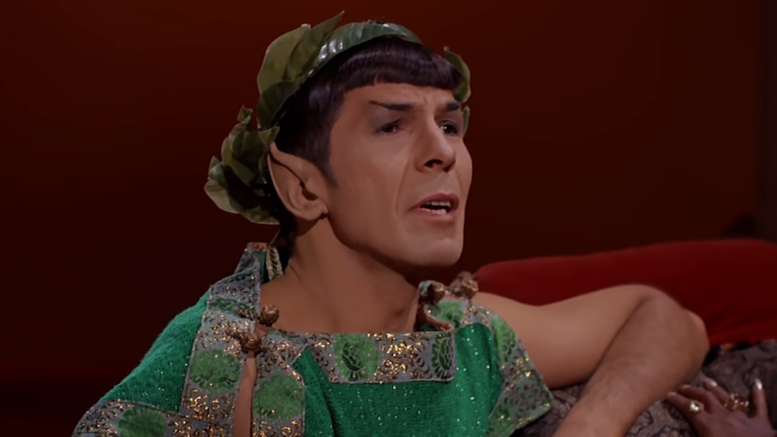
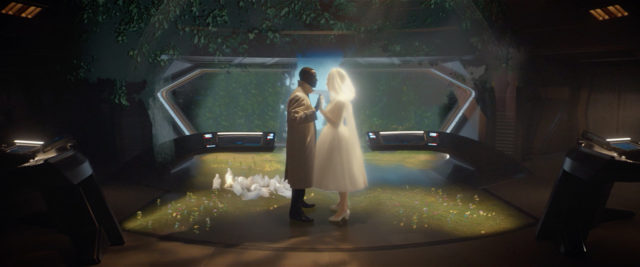
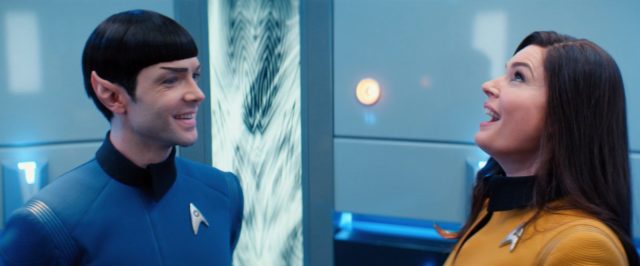
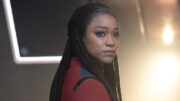
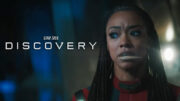
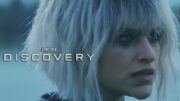
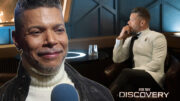
I think the best one that’s missing from here is The Minstrel Boy from The Wounded.
Just came by to say what the good legate said.
Great collection of good songs and memories. Enjoyed very much watching these clips all together at once. =)
Missed out on Uhura singing in THE CHANGELING before Nomad brainwipes that ‘mass of conflicting impulses.’ And TFF too, for that matter, even if they dubbed over her.
My fave is from a TREK comic book, when the gang is hanging out on their Bird of Prey and she sings the words to the theme to Star Trek. So wished they had stayed renegade in the movies.
Think about music!
In college I had a Star Trek friend who moved away. I had introduced The Way to Eden episode to her before. After she moved my brothers and I recreated every number from Eden (even Crack My Knuckles) and sent it to her as a mix tape. Bitter Dregs was our encore bonus track. I thought it came out pretty well. I still have it 30 yrs later.
This is my new favorite story.
“The authors are aware that this song exists.”
Bwah!
“I’ve always wanted to play to a captive audience.”
No DS9 with “It’s Only A Paper Moon”? Or VOY’s “Virtuoso”?
And I love this episode too.
Star Trek The musical
The genetically modified quartet musical sequence from “Chrysalis” is one of my favourites.
Personally, the song that Lore sings in “Brothers” as he’s beaming away always haunted me.
The very best in Trek musical performances — by far — are the DS9 Vic Fontaine holosuite numbers — peaking with Vic’s duet with Sisko (who has a wonderful voice) singing The Best Is Yet To Come. The very best.
DS9 – Chrysalis and Vic Fontaine anything, and Voyager with The Doctor and opera – definitely need to include.
You are my sunshine—- such a heart wrenching scene from a lovely episode. The full lyrics are pretty tear-jerky as well. Funny that it’s thought of as a cheerful song.
Totally forgot Robert Picardo has a great voice, and Jery Ryan….what a lovely voice!
How do you not include The Sisko and Vic singing, “The Best is Yet to Come”? Brooks is one of the best singers among regular cast members of all the shows.
You can also include The Doctor’s version of La Donna E Mobile from VOY Tinker, Tenor, Doctor, Spy, especially the Tuvok lyrics! Hilarious!
https://youtu.be/TKAL_219oH8
‘the best is yet to come…..’
No love for the copyright challlenged “Goodnight Sweetheart” from THE CITY ON THE EDGE OF FOREVER?